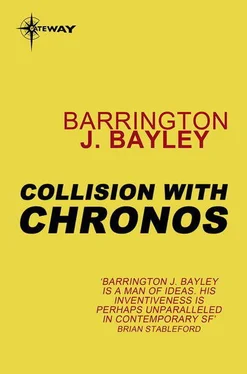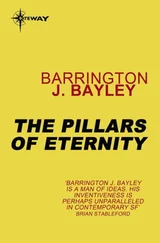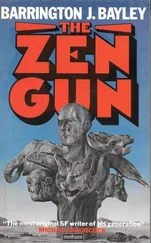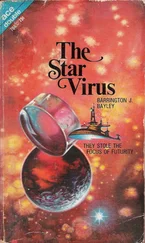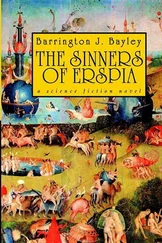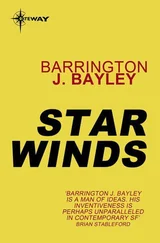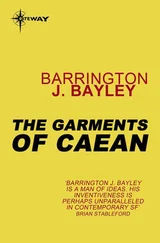“Just over five years.”
“Five years? And you’ve kept quiet about it all that time?”
Brask smiled distantly. “Patience, Citizen. You’ll understand everything shortly.”
They came to a heavy door guarded by two armed Titans. Brask presented a pass; the door opened with the sigh of a pneumatic lock.
Beyond the guarded door the atmosphere was quieter and more calm. “This leads to the main research area,” Brask told him. “I’ll introduce you to your new colleagues shortly. They begin the day here with an ideological session – would you care to drop in on it? It must be nearly over now.”
Resignedly Heshke nodded. Brask led him down a corridor and they entered a small auditorium. An audience of about two hundred white-smocked men and women faced a large screen which illustrated a commentary by means of a succession of pictures.
The visualisation, Heshke noted, was skilled and professional. The scene at the moment was a soulful one of the sun setting over the forest-clad hills; in the foreground a deep blue sea lapped against a rocky, encrusted shore.
But smoothly the picture merged into a slow collage of viruses and soil bacteria. The sudden transition from the expansive world of forest, sea and sun to the invisible, microscopic world at the boundary of life was, Heshke thought, effective. It caught his attention right away, and he listened with interest to the mature, persuasive voice that accompanied the vidtrack, knitting the brief scenes together into a coherent whole.
“Here we have the germinal essence, ” purred the voice on the audtrack. “In these primary particles of life the spirit and essence of the planet Earth has concentrated all its being. By means of a mighty distillation from the potentiality of rock and soil, sun, ocean and lightning, were created these seeds of all future things. From this moment Earth, which before was barren, has produced DNA; and from this DNA, like a giant rising from the sea, there inevitably springs in due season the culmination of the entire process: the entity for which all the rest of Terrestrial life is but a platform. This is known as the culminating essence, or the human essence. ”
The pictures that illustrated this speech were swift and dizzying. The virus forms vanished; momentary images of DNA helices, dancing chromosomes and dividing cell nuclei appeared one after the other, interspersed with a swift procession of diverse living species as the stages of evolution unfolded.
At the end of the sequence, to coincide with the speaker’s last words, appeared the image of a young, naked male, godlike both in proportion and feature (and posed no doubt by a suitable Titan). The figure stood with arms outstretched, light streaming around his silhouette from a point source in the background, slowly fading into a picture of Earth swimming in space.
“It follows,” continued the voice soberly, “that evolution is not a series of arbitrary accidents but a whole process, tending toward a predestined end. It follows that by nature Earth produces but one supreme species, this being her destiny, and it follows that this is a law holding for all planets throughout the universe. Earth is our mother, our home, our sustenance. From Earth’s soil we draw our blood. We are her sons; no one shall take her from us.”
With a sonorous orchestral chord the screen went blank. Heshke was fascinated. Blood and soil, he thought again. There was much in the lecture that, paradoxically, was both appealing and repellent: the mysticism, the blatant Earth-worship, the belief in destiny. But who knows, he thought, there might be something in it. Perhaps evolution does work like that.
The audience rose and filed out silently. Brask nudged Heshke. “Now you can meet the people you’ll be working with.”
Three members of the audience stayed behind, going over to a small table at the back. Brask and Heshke joined them.
Two of the men had the armbands and precise bearing of Titans. The third was a civilian, standing out from the others by reason of his sloppy slouch. He had a habit of glancing furtively around him, as if wishing he were somewhere else, and his mouth was twisted into a permanent expression of sardonic bitterness.
Brask made introductions. “Titan-Lieutenant Vardanian, Titan-Lieutenant Spawart, Citizen Leard Ascar. Gentlemen, this is Citizen Rond Heshke.”
All made brief bows.
“Are you gentlemen archaeologists also?” Heshke asked as politely as he could, since he did not recognise their names.
“No, we are physicists,” Leard Ascar said shortly. His voice matched his face, ironical, mocking.
Brask motioned them to chairs. “It’s time to put you into the picture, Citizen,” he said to Heshke. “I hope you’re able to absorb strange facts at short notice, because you’ll need to.”
He flicked a switch on a small console on the table. The big screen lit up, but for the moment remained without a picture.
“We told you earlier that we had discovered an alien artifact in working order. You probably imagined it had been found in a dig or something of that sort. In point of fact it was discovered lying in the open on a grass field, quite accidentally, far from any known alien remains. Moreover it was obviously of very recent manufacture.”
He flashed a picture on the screen. The background was as he had described: a grassy meadow, with a line of trees in the distance. Lying in the foreground was a silvery cylinder, rounded at both ends and with dull, rather opaque-looking windows set fore and aft. A Titan stood by it for size comparison, revealing it to be about seven feet in diameter and about twelve in length.
“As you see, it’s a vehicle of some sort,” Brask continued. “Within were two aliens who appeared to have died shortly before of asphyxiation. As these were our first complete specimens they have increased our knowledge of the enemy to quite an extent.”
The screen blanked for a moment and then flicked to another picture. The cylinder had been opened. The two occupants, seen partially because of the awkwardness of handling the camera through the opening, were strapped side by side in narrow bucket seats. They were small furry creatures with pointed snouts and pink mole-like hands, being perhaps the size of young chimpanzees. After a few seconds the picture flickered and the same two corpses were shown more completely, pinned to a slab in a Titan laboratory.
Despite his excitement, Heshke found time to be pleased that the specimens resembled quite closely the reconstructions that had been attempted from skeletons.
“So it was a spaceship,” he said.
“That was naturally our conclusion, to begin with. But we were wrong. Only gradually, by experimenting with the vehicle’s drive unit, were we able to piece together what it did.”
Heshke noticed that the physicists were all looking at the floor, as though hearing the subject talked about embarrassed them.
“The equipment aboard the vessel used a principle completely unknown to us,” Brask went on. “Movement through space – through comparatively short distances of space, not interplanetary space – could in fact be achieved as a by-product, but that was not its main purpose. Its main purpose is to move through time. The artifact we had stumbled on was a time machine.”
The physicists continued looking at the floor. Heshke let the bombshell sink into his mind.
Time. A time machine. The archaeologist’s dream.
“So they’re from the past,” he said finally, staring at the picture of the alien time travellers.
Brask nodded. “That would be the assumption. Presumably they developed the means of time travel during the final stages of their sojourn on Earth, but too late to do them any good. We can only hope the secret is not known on their home world, but frankly I think we would have felt some effect from it if it was.”
Читать дальше
